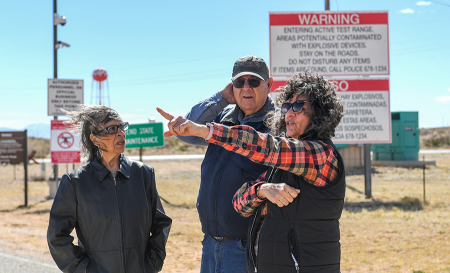"No one can solve this problem alone, but together we can change things for the better."
U.S. House Under Pressure to Renew Aid for ‘Downwinders’
May 2024
By Chris Rostampour
Communities adversely affected by U.S. nuclear testing and weapons production activities in the early years of the nuclear age and their congressional representatives are urging the House of Representatives to reauthorize and expand an expiring federal program that compensates victims of nuclear radiation.

The Democratic-led Senate voted 69-30 on March 7 to approve a stand-alone bill to extend and expand the 30-year-old program, called the Radiation Exposure Compensation Act (RECA).
“After decades of work and tireless advocacy, we are the closest we have ever been to providing justice and compensation for those who have suffered at the hands of our country’s national security,” Sen. Ben Ray Luján (D-N.M.) said in a statement following the vote.
Supporters are now trying to convince the Republican-led House to take action before RECA expires June 7.
“We need to make sure they understand this is a nonpartisan issue,” Tina Cordova, a cancer survivor and longtime advocate for expanding the law, said in an interview with Source New Mexico.
“For House members from places like Utah, Arizona, Idaho, Nevada, and Montana, [it is important] that they understand voting against this is voting against people impacted in their states,” she said.
RECA was first passed by Congress in 1990 to offer one-time compensation packages to people in certain western counties and states who unknowingly were exposed to radiation fallout from past atmospheric nuclear test explosions, federal workers who participated in Manhattan Project-era nuclear weapons activities, and certain uranium miners.
But the program had several limitations and did not consider other communities and individuals in the United States impacted by U.S. nuclear testing and development, including “downwinders” in New Mexico affected by the first nuclear test explosion, called “Trinity,” in July 1945. (See ACT, January/February 2024; September 2023.)
Last September, senators added an amendment to the 2024 National Defense Authorization Act that would have extended RECA for two decades and significantly expanded its geographical coverage.
But the House leadership omitted this amendment in its version of the defense bill. In response, RECA advocates in each chamber, including Sen. Josh Hawley (R-Mo.), worked to trim the amendment so that it would cost less. This limited version was also rejected. Co-sponsors of the bill blamed Republican leaders in the House and Senate for this failure. (See ACT, January/February 2024.)
RECA reauthorization supporters are seeking to attach the bill approved by the Senate in March to a legislative vehicle in the House. The proposal would reauthorize the program for an additional six years.
Additionally, it would expand coverage to include thousands of New Mexicans around the Trinity test site; people from Colorado, Idaho, Montana, and Guam; and affected people in all counties in Arizona, Nevada, and Utah, not just select counties in those states, as the original legislation allowed. The new bill also would cover certain communities in Alaska, Kentucky, Missouri, and Tennessee where Cold War-era nuclear waste has contaminated the environment and uranium miners who started their jobs after 1971.
The proposed legislation is estimated to cost about $50-60 billion. Since 1990, the program has provided approximately $2.6 billion in compensation for claims.
On March 7, Luján urged House Speaker Mike Johnson (R-La.) to bring the legislation for a vote. On March 11, a bipartisan group of four members of Congress led by Rep. Ann Wagner (R-Mo.) wrote a letter to Johnson and other House and Senate leaders, saying that “it is imperative that [RECA] be attached to the upcoming fiscal year…2024 appropriations package.”
“There is broad bipartisan and bicameral agreement that the United States must compensate American citizens who have gotten cancer and other diseases as a result of reckless government actions that exposed them to dangerous levels of radiation,” the lawmakers wrote.
But Johnson confirmed on March 21 that the RECA reauthorization legislation would not be included in the appropriations bill, saying, “I understand her position, and I look forward to working closely with Ann as we chart a path together for the House to move forward with evaluating and acting on a reauthorization measure.”
Hawley, who co-sponsored the Senate bill, blasted its exclusion from the House measure in a social media post the same day. “Politicians have talked like this for decades,” he wrote. “While doing nothing. The time to talk is over. The time to ACT is now. Put RECA on the floor and vote on it. Stop screwing around with Missouri.” Wagner, Hawley, Luján, and others continue to explore options for attaching the Senate version of the RECA reauthorization bill to another legislative vehicle in the House.
Meanwhile, President Joe Biden in March reiterated his support for the bill, signaling that he would sign it into law if it reached his desk. From 1945 to 1963, the United States conducted 215 atmospheric nuclear tests.
